《英语 第2册》
| 作者 | 陈琳主编 编者 |
|---|---|
| 出版 | 北京:人民教育出版社 |
| 参考页数 | 476 |
| 出版时间 | 1980(求助前请核对) 目录预览 |
| ISBN号 | 9012·076 — 求助条款 |
| PDF编号 | 810123338(仅供预览,未存储实际文件) |
| 求助格式 | 扫描PDF(若分多册发行,每次仅能受理1册) |
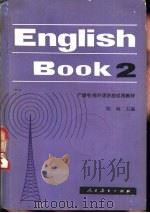
第一课1
基本句型1
1. Do you get up at six every day?1
Yes, I do.1
No, I don’t. I don’t get up at six.1
2. She gets up at seven.1
3. She doesn’t get up at six.1
4. Does she get up at six?1
Yes, she does.1
No, she doesn’t.1
5. What day is today?1
Today is Friday.1
6. What month is this?1
This is May1
7. What year is this?1
This is 1981 (nineteen eighty-one).1
8. What’s the date today?1
Today is May 8, 1981.2
9. What time is it?2
It’s eleven thirty. (It’s half past eleven.)2
It’s eleven fifty. (It’s ten to twelve.)2
会话14
课文The Sun, the Earth and the Moon14
语法19
1.实义动词的第三人称单数形式19
2.以实义动词为谓语动词的一般疑问句20
3.名词所有格22
4.序数词22
5.年、月、日及时刻表示法24
语音1某些辅音字母的读音27
2.某些辅音字母组合的读音28
3.辅音连缀29
第二课37
基本句型37
1. When (What time) do youget up in the morning?37
When (What time) does she go to work?37
2. Where do you work?37
Where does she work?37
3. Why do you get up so early?37
Why does he get up so early?37
4. How do you spell the word?37
How does he go to work?37
5. What do you study?37
What does she study?37
6. What foreign language do you study?37
What foreign language does she study?37
7. What do you want to do?37
What does she want to do?37
8. Whose pen is this?37
Whose is it?37
9. Let’s go to the park, shall we?37
Shall we go by bus?37
会话53
课文Bob Green and Li Ping53
语法59
1.特殊疑问句59
2.名词性物主代词61
3.Shall I (we)……?的习惯用法61
语音1某些字母组合的读音规则62
2.祈使句中please一词的读法63
3.称呼语的读法63
4.含有Shall I (we)句子的读法63
第三课69
基本句型1. I am going to have a meeting.69
2. I am not going to watch TV69
3. Are you going to have a meeting?69
Yes, I am.69
No, I am not.69
4. What are you going to do?69
5. Are you a student or a worker?69
6. Do you get up at six or at seven?69
7. Does she get up at six or at seven?69
8. Which is yours, this one or that one?69
9. He is a student and I am a worker.69
10. Zhang is not a student but his brother is.69
会话81
课文The Thomsons’ Weekend81
语法87
1. “be going to+动词原形”的用法87
2.选择疑问句89
3.简单句和并列句90
4.名词及其类别91
语音92
1.选择疑问句的语调92
2.并列句的语调93
第四课99
基本句型99
1. You are a student, aren’t you?99
Yes, I am.99
No, I am not.99
2. He isn’t a doctor, is he?99
Yes, he is.99
No, he isn’t.99
3. You work at a factory, don’t you?99
Yes, I do.99
No, I don’t.99
4. He doesn’t work at a factory, does he?99
Yes, he does.99
No, he doesn’t.99
5. You are going to see the film, aren’t you?99
Yes, I am.99
No, I am not.99
6. He isn’t going to see the film, is he?99
Yes, he is99
No, he isn’t.99
7. Thereis a nursery in your factory, isn’t there?99
Yes, there is.99
No, there isn’t.99
8. There isn’t a TV in the room, is there?99
Yes, there is.100
No, there isn’t.100
9. Which is bigger, this one or that one?100
This one is bigger than that one.100
10. Which runs faster, a dog or a pig?100
A dog runs faster than a pig.100
11. I do some reading before I go to bed.100
12. He does some running after he gets up.100
会话111
课文The United States and New York City111
语法118
1.反意疑问句118
2.形容词和副词的比较等级及其词形119
3.使用形容词或副词的比较级的句型120
4.状语从句121
语音122
1.反意疑问句的语调122
2.句首状语的语调122
第五课127
基本句型127
1. I am learning English from the radio.127
2. He is not learning English from the radio.127
3. Are they learning English from the radio?127
Yes, they are.127
No, they aren’t.127
4. What are you doing?127
5. Wang is the youngest in our group.127
6. It is the best story in the book.127
7. He is absent today because he is ill.127
8. Please come over for a chat when youhave time.127
9. Is there any hot water in that thermos?127
10. There is no hot water in that thermos.127
11. But there is some in this one.127
会话135
课文Sunday in the Park138
语法142
1.现在进行时142
2.不定代词some, any, no143
3.包含最高级形容词或副词的句型144
语音意群、意群停顿和呼吸群停顿144
第六课150
基本句型150
1. I shall (I’ll) have a meeting this afternoon.150
2. He will not (He won’t) arrive today.150
3. I’ll go with you if you like.150
4. When will he be back?150
5. I can finish the work in an hour.150
6. He can’t come to the meeting today.150
7. Can you speak French?150
Yes, I can.150
No, I can’t.150
8. May I borrow this book?150
Yes, of course.150
No, I’m afraid not.150
9. Must I return it tomorrow?150
Yes, you must.150
No, you needn’t.150
10. You mustn’t be so careless.150
会话155
课文Two Canadian Friends158
语法165
1.一般将来时165
2. Shall I (we).?和Will you.?的习惯用法167
3条件状语从句168
4.情态动词can, may. must169
语音170
1.句子重音与逻辑重音170
2.含有状语从句的复合句的语调171
复习课(一)176
1.英语动词的时态176
2.冠词的用法——专有名词前冠词的用法180
3.对句中成分提问示例181
第七课186
基本句型186
1. Yesterday was Wednesday.186
2. I was (wasn’t) a student before 1960.186
3. He worked at a factory before liberation.186
4. He didn’t go to school before liberation.186
5. Were (Weren’t) you a worker before 1966?186
Yes, I was.186
No, I wasn’t.186
6. Did (Didn’t) yougo to the English film yesterday?186
Yes, I did.186
No, I didn’t.186
7. You were (weren’t) a student before 1966,weren’t (were) you?186
Yes, I was.186
No, I wasn’t.186
8. He worked (didn’t work) at a factory before liberation, didn’t (did) he?186
Yes, he did.186
No, he didn’t.186
会话195
课文Big Brother and Young Brother (Ⅰ)197
语法205
1.一般过去时205
2.实义动词的过去时形式的构成208
3.与一般过去时一起使用的时间状语209
语音211
1.节奏(Ⅰ)211
2.节奏类型(Ⅰ)212
第八课218
基本句218
1. Where were you yesterday afternoon?218
2. Why were you late this morning?218
3.When were you there?218
4. When were you born?218
I was born in 1947.218
5. How was yesterday’s film?218
6. Where did you go yesterday?218
7. How long did you stay there?218
8. When did you come back?218
9. Why did you come back so early?218
10. Who spoke at the meeting?218
11. There was (wasn’t) a footballmatch yesterday.218
12. Was there a football match yesterday?218
Yes, there was.218
No, there wasn’t.218
会话225
课文Big Brother and Young Brother (Ⅱ)227
语法233
1.一般过去时的特殊疑问句233
2. “there be’”结构的一般过去时形式234
语音235
1.节奏(Ⅱ)235
2.节奏类型(Ⅱ)235
第九课242
基本句型1. I have read the book.242
2. He hasn’t read the book.242
3. Have you seen that film?242
Yes, I have.242
No, I haven’t.242
4. I hope you can come tomorrow.242
5. I hear Professor Wang is going tospeak to us next week.242
6. They were having a meeting when we got there242
7. Was he living in Sichuan then?242
Yes, he was.242
No, he wasn’t.242
8. Lesson Nine is as difficult as Lesson Eight.242
9. Shanghai is not as (so) hot as Wuhan in summer.242
10. Is Nanjing as big as Shanghai?242
会话251
课文The Little Match Girl253
语法262
1.现在完成时262
2.动词过去分词的构成263
3.过去进行时265
4.宾语从句266
5.用as…as表示比较的句型268
语音269
1.节奏(Ⅲ)269
2.节奏类型(Ⅲ)270
3.含有宾语从句的复合句的语调271
第十课278
基本句型1. Where have you been?278
I have been to the library.278
2. Why have you come so early?278
3. What has he done?278
4. Who has broken the glass?278
5. How many words have you learned?278
6. How long have you been a worker?278
7. We have lived in this house sincewe came to Beijing.278
8. He studies as hard as his brother.278
9. He doesn’t study as (so) hard as his brother.278
10. Do you (Does she) study ashard as your (her) brother?278
Yes, I do (she does).278
No, I don’t (she doesn’t).278
会话287
课文A Story about Comrade Zhou Enlai290
语法296
1.现在完成时的特殊疑问句296
2.现在完成时与一般过去时的比较297
3.与现在完成时一起使用的时间状语298
4. have (has) been与have (has) gone的区别299
语音300
1.节奏(Ⅳ)300
2.节奏类型(Ⅳ)301
复习课(二)308
1.句子种类:简单句、并列句与复合句308
2.动词的基本词形311
3.动词不定式在句子中的功能312
4.常用动词句型315
附录325
一、配音听力材料325
二、英国广播公司电视英语节目《沃尔特与康妮》选335
三、练习答案401
四、常用不规则动词444
五、词汇表449
1980《英语 第2册》由于是年代较久的资料都绝版了,几乎不可能购买到实物。如果大家为了学习确实需要,可向博主求助其电子版PDF文件(由陈琳主编 1980 北京:人民教育出版社 出版的版本) 。对合法合规的求助,我会当即受理并将下载地址发送给你。
高度相关资料
-
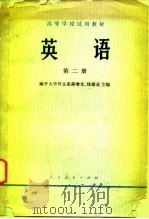
- 英语 第2册
- 1979 北京:人民教育出版社
-

- 英语 第2册
- 1973
-
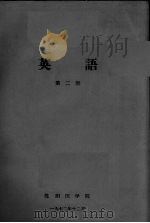
- 英语 第2册
- 1972 沈阳医学院
-
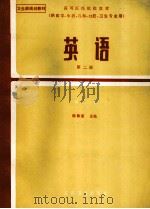
- 英语 第2册
- 1995 北京:人民卫生出版社
-

- 英语 第2册
- 1982 北京:人民教育出版社
-

- 英语 第2册
- 1987 北京:中国少年儿童出版社
-
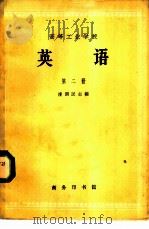
- 英语 第2册
- 1963 北京:商务印书馆
-
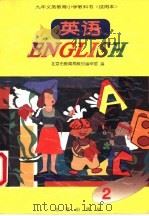
- 英语 第2册
- 1993 北京:北京出版社
-

- 英语 第2册
- 1993 四川出版集团;成都:四川教育出版社
-

- 英语 第2册
- 1980 北京:人民教育出版社
-
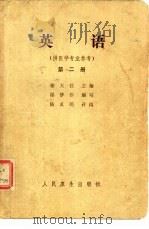
- 英语 第2册
- 1964 北京:人民卫生出版社
-
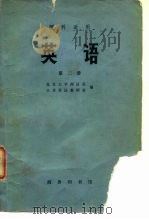
- 英语 第2册
- 1975 北京:商务印书馆
-
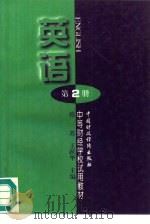
- 英语 第2册
- 1996 北京:中国财政经济出版社
-
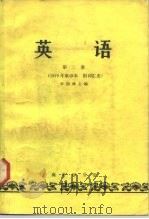
- 英语 第2册
- 1982 北京:商务印书馆
-
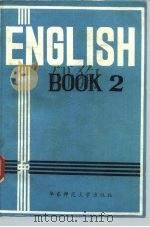
- 英语 第2册
- 1984 上海:华东师范大学出版社
提示:百度云已更名为百度网盘(百度盘),天翼云盘、微盘下载地址……暂未提供。➥ PDF文字可复制化或转WORD